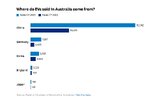wayneL
VIVA LA LIBERTAD, CARAJO!
- Joined
- 9 July 2004
- Posts
- 26,008
- Reactions
- 13,335
It might surprise many here to know that I am against negative gearing in its current form.Idea! - reduce the NG on new property's to 95% loss deduction, growing by 5% every 2 years until zero, would be a lot more politically palatable for all concerned...
The Noalition spin on this of course would be the usual slippery slope stuff, shame really.
In normal non real estate business if an activity is undertaken with the express intention of making a loss for an extended period of time for the express purpose of claiming a deduction, the deduction is disallowed.
I think this should apply to property investment also.
I am not against claiming losses against potential future profit can be shown that prophet is intended and achievable within a reasonable period of time. However, again as with normal business, if the ownership of the property is in a separate structure, those losses can only be claimed against future profits and not offset against other income.
In other words real estate investment should be treated just like any other business, whether it be a butcher baker or candlestick maker.
FWIW



